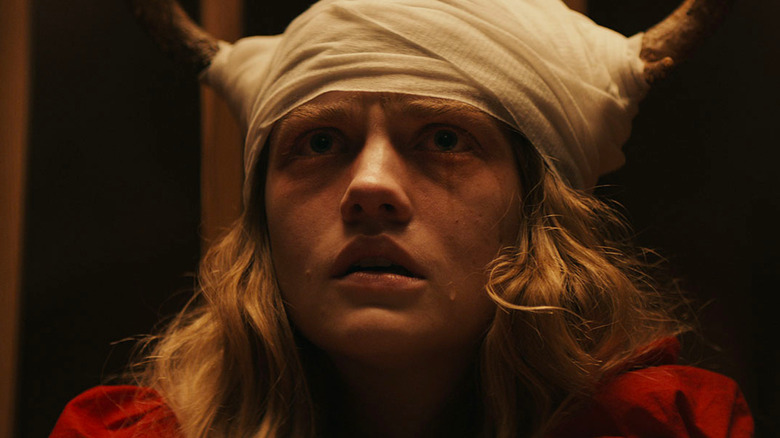Fixation Review: An Ultra-Stylish, Uneven Trip Into Madness [TIFF]
Horror — and horror-adjacent films — have a big "it was all in their head!" problem. To be fair, this isn't a new trend — the 1920 silent classic "The Cabinet of Dr. Caligari" uses this idea with now-iconic results. But I feel like more and more filmmakers are leaning back on this when they attempt to make a genre pic. I don't mean to say they're all making movies where everything is a hallucination, but it seems more often than not that when a filmmaker wants to give us something scary or disturbing, they simply shoe-horn in a dream and/or fantasy sequence and call it a day. And it really feels lazy.
Mercedes Bryce Morgan's "Fixation" takes this to the extreme, dropping us into a story where nothing can be trusted. Is it all a dream? A nightmare? A very elaborate show? You'll have to watch to find out — but will you even care all that much? I am not here to completely bury "Fixation," because Morgan shows great promise. This is no doubt a film with a rather small budget and yet it looks like a million bucks — Morgan and company have gone all-out in creating a solid, concrete, believable world with sets and costume designs that never, ever look cheap. It's impressive.
But for all its stylish flair, "Fixation" gets lost in its muddled story. When nothing is as it really seems, and we can't be sure of what we're watching, how are we supposed to grab hold of anything and find ourselves committed to the results?
What's going on?
Dora (a fierce Maddie Hasso, who makes the best impression in the entire movie) is locked away in a mental hospital, complete with a straightjacket. She has no idea how she got here, and she has no idea where here is, exactly. The hospital staff keeps changing between being helpful and cruel, and the doctor overseeing the entire thing (Stephen McHattie, who seems to be having a great time) is plenty mysterious. We eventually learn that Dora did ... something a few years ago, and it's landed her here in anticipation of an upcoming trial. But what did she do? Did she even do anything at all, or is this some sort of very elaborate torment?
Morgan and screenwriter William Day Frank want to keep us guessing, and that's fine. But it all grows rather tiresome, especially since the cast around Dora have been instructed to act smug as hell, as if they all know something Dora does not (because they do). Genesis Rodriguez, playing another of Dora's doctors, is the worst offender here, constantly playing her part like a cat that swallowed a canary. Hey, we get it! Everyone is keeping secrets from Dora! This is getting really tiresome!
Dora travels throughout the hospital, and the hospital sometimes ceases to be a hospital. Rooms that simply shouldn't exist appear, and elaborate situations arise full of a cast of characters. At the same time, Dora never seems to see any other patients. Is she really in a hospital, or is she a captive in some insane experiment? Or maybe that's just her madness talking, playing with her mind, and creating elaborate delusions in the process.
I appreciated the off-kilter vibe of it all, coupled with impressive set design work that puts much bigger budgeted movies to shame. But after about the umpteenth scene of Dora tearfully asking what's going on, only to have her doctors and/or torments grin at her knowingly without saying a word, I was anything but fixated on "Fixation."
/Film Rating: 5 out of 10

